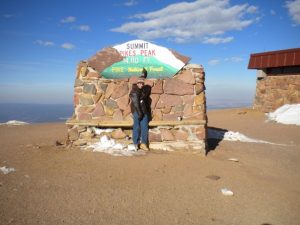My first week home from the rehab hospital, I suffered a seizure. It took days before I could feel the left side of my body. I was terrified. I was afraid all the hard work I had put in was lost and I would have to start all over again.
Turns out it wasn’t a medical issue, but a lifestyle one. In the hospital, I was given a strict diet, mainly drank water, and exercised regularly. At home, I ate whatever I wanted, and drank caffeinated sodas, and exercise was the farthest thing from my mind.
I had become comfortable after my recovery and I let my guard down. When I had a follow-up with my neurologist, the instructions were obvious:
- Be more nutrition-conscious and drink more water, less caffeine.
- Exercise regularly to keep my muscles stimulated.
- Get plenty of rest.
A month after my seizure I began biking. It became an important part of my training to strengthen my left side. Later I joined a local gym and started strength training. Fortunately, the main fitness trainer had experience working with persons with disabilities and he was able to coach me on my journey.
It was then I learned the importance of switching up my workouts. From time to time we need to use different fitness routine to keep our bodies from getting comfortable and plateauing. This keeps the muscles confused which allows them to grow. Medical science has shown that it takes about 6 to 8 weeks to create a routine and 2 to 4 weeks to create muscle memory.
I have three eight-week exercise cycles and halfway through I reverse the weight process. When I tell you it shocks my body, I mean my body is sore and uncomfortable for weeks; which is what I want, because I tend to get bored when I get comfortable in my exercises.
Comfortable?
Being comfortable something we desire in most situations. The dictionary tells us being comfortable provides relaxation and puts us at ease. It’s a goal most of us want to achieve.
Most writers (me included) have certain goals in their writing career they are striving for: fame, fortune, a better lifestyle, or making a mark on this world. I’m sure there are other goals I could mention. Take the time to think about what motivates you to keep writing.
We spend hours at our computers or researching in libraries and sacrifice time with our family and loved ones. It’s human nature to want to get to the top.

A decade ago I had a chance to go to the top of Pikes Peak in Colorado, over 14,000 feet above sea level. While the views were spectacular, I learned an important lesson.
Nothing grows on the mountaintop, no trees, grass, and certainly not flowers. That’s when I realized being on top might not be all it’s cracked up to be.

It reaffirms that often the journey is more beneficial than the destination. This is why writing coaches and professionals advise us to keep writing. Not necessarily to get our big break, but to keep growing our writing muscles and voices.
As we flex our writing muscles to create stories and articles we work more than just our hands and fingers, we flex the most powerful body part—our brains! Like strength training, training in the craft of writing requires consistent use of those muscles. It requires getting out of our comfort zones.
We can’t become lazy and apathetic just because we’ve reached our writing goals. I am reminded what Christian author Jerry Jenkins said, “In any writer. I look for the –ilities: humility, teachability, coachability, availability, and flexibility.”1
We must keep growing as a writer, which means we can’t become comfortable:
1. Keep learning the craft.
2. Keep reading.
3. Attend conferences and workshops.
4. Find a mentor or guide in the business.
5. Keep being creative.
6. And most importantly, keep writing.
If I don’t continue to exercise, my muscles can atrophy. Lack of use and growth can cause muscle tissue to deteriorate and waste away.
In the same way, how tragic would it be for writers to spend years seeking publication only to let their skills, passion, and creativity waste away?
Stay Rested!
I am not endorsing never taking a break or resting. Rest is integral to muscle growth, this is when the muscle rebuilds itself. Rest helps refresh us. Rest means different things to different people:
- Sleep.
- Not working.
- Reading.
- Absence of responsibility.
I can be on a bike ride 40 miles out and feel rested. My goal is to keep growing, not get comfortable!
1 Jenkins, J,B 2006 (Writing For the Soul) Writers Digest Books, Pge 105.

Martin Johnson survived a severe car accident with a (T.B.I.) Traumatic brain injury which left him legally blind and partially paralyzed on the left side. He is an award-winning Christian screenwriter who has recently finished his first Christian nonfiction book. Martin has spent the last nine years volunteering as an ambassador and promoter for Promise Keepers ministries. While speaking to local men’s ministries he shares his testimony. He explains The Jesus Paradigm and how following Jesus changes what matters most in our lives. Martin lives in a Georgia and connects with readers at Spiritual Perspectives of Da Single Guy and on Twitter at mtjohnson51.



No Comments